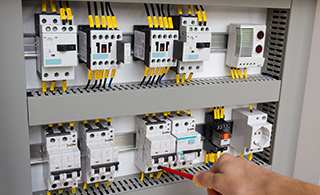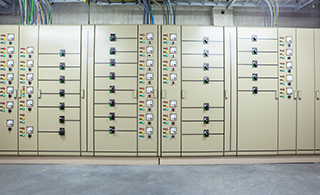 Electronics & Electrical
Eritrea-Asmara: EDF — Supply, installation and commissioning of solar PV generation system for the Areza Maidma solar PV mini-grid project
Electronics & Electrical
Eritrea-Asmara: EDF — Supply, installation and commissioning of solar PV generation system for the Areza Maidma solar PV mini-grid project
Eritrea-Asmara: EDF — Supply, installation and commissioning of solar PV generation system for the Areza Maidma solar PV mini-grid project
Eritrea-Asmara: EDF — Supply, installation and commissioning of solar PV generation system for the Areza Maidma solar PV mini-grid project has been closed on 10 Feb 2016. It no longer accepts any bids. For further information, you can contact the The Government of the State of Eritrea
Bellow, you can find more information about this project:
Location: Eritrea
General information
The Government of the State of Eritrea
Electronics & Electrical
Closed
Timeline
07 May 2016
10 Feb 2016
Not available
Contacts
Description
Supply contract notice
Location – Areza-Maidma, southern Debub region, Eritrea
The Government of the State of Eritrea, represented by the Ministry of Energy and Mines, Asmara, ERITREA.
Contract specifications
Terms of participation
All supplies under this contract must originate in 1 or more of these countries.
Selection and award criteria
1) Economic and financial capacity of tenderer (based on i.a. item 3 of the tender form for a supply contract). In the case of the tenderer being a public body, equivalent information should be provided. The reference period which will be taken into account will be the last 3 years for which accounts have been closed:
• average annual turnover of the tenderer must exceed the annualised maximum budget of the tendered contract value,
• current ratio (current assets/current liabilities) in the last year for which accounts have been closed must be at least 1. In the case of a consortium, this criterion must be fulfilled by each member.
2) Professional capacity of tenderer (based on i.a. items 4 and 5 of the tender form for a supply contract). The reference period which will be taken into account will be the last 5 years from the submission deadline:
• has a professional certificate appropriate to this contract,
• quality management certification: contractor should be certified by a relevant recognised accreditation institution with a certificate of ISO 9001:2008 or equivalent,
• environmental certification: the contractor should be certified by a relevant recognised accreditation institution with a certificate of ISO 14001 or equivalent,
• at least 20 staff currently work for the tenderer in fields related to this contract, and
• all roles mentioned in the table below have to be fulfilled by a permanent employee of the tenderer:
1. project manager:
item No; description; unit; required:
1.1; experience in implementation of power plant or infrastructure projects (not less than 5 years as manager); years; at least 7;
2. design engineer:
item No; description; unit; required:
2.1; experience in the executive design of medium to large-scale hybrid renewable electrification plants; years; at least 3;
2.2; proven track record of medium to large-scale hybrid renewable electrification designed; MW; at least 1;
3. responsible electrical engineer:
item No; description; unit; required:
3.1; with experience in the design of DC low voltage installations, medium voltage substations and DC installations with a voltage of up to 1 000 V and MV installations as well as substation works and large-scale batteries; years; at least 5;
4. responsible civil engineer:
item No; description; unit; required:
4.1; with experience in the design of metal structures (steel or aluminium), corresponding foundations and facility structures; years; at least 5;
5. PV power plant construction manager (engineer):
item No; description; unit; required:
5.1; with experience in on-site construction management; years; at least 7;
5.2; with experience in the construction management of PV power plants (> 1 000 kW); years; at least 5;
5.3; with experience in the construction management of diesel power generation plants (there can also be a separate construction manager only for the diesel part who fulfils this criteria); years; at least 5;
5.4; with experience in the installation of large-scale batteries (there can also be a separate construction manager only for the battery part who fulfils this criteria); years; at least 3;
5.5; one of the plant construction sites managed has to be outside the country of origin; MW; minimum size 1;
6. civil engineer (supervision of construction):
item No; description; unit; required:
6.1; proven experience in on-site construction supervision of building metal structures of comparable size, corresponding foundations and facility structures, see expert under 4; years; at least 5;
6.2; one of the plant construction sites managed has to be outside the country of origin; MW; minimum size 1;
7. electrical engineer (supervision of construction):
item No; description; unit; required:
7.1; with proven experience in on-site supervision of installation work of DC low-voltage installations, medium-voltage substations and DC installations with a voltage below 1 000 V and MV installations as well as substation works and batteries, see expert under 3; years; at least 5.
3) Technical capacity of tenderer (based on i.a. items 5 and 6 of the tender form for a supply contract). The reference period which will be taken into account will be the last 5 years from the submission deadline:
• the tenderer has completed at least 3 hybrid projects (involving PV, diesel and batteries) in the MW scale with a minimum renewable energy penetration of at least 30 % as responsible EPC contractor,
• the tenderer has completed at least 5 hybrid generation projects (at least 2 different generation technologies) in the MW scale as responsible EPC contractor,
• the tenderer has executed at least 2 renewable energy hybrid projects outside the country of origin (if a non-Eritrean company),
• the tenderer has executed at least 1 renewable energy hybrid project in Africa/developing countries,
• the tenderer has a track record as leading the O&M of renewable energy hybrid power plant projects for minimum 2 years in at least 2 projects.
This means that the contract the tenderer refers to could have been started or completed at any time during the indicated period but it does not necessarily have to be started and completed during that period, nor implemented during the entire period. Tenderers are allowed to refer either to projects completed within the reference period (although started earlier) or to projects not yet completed. In the first case the project will be considered in its whole if proper evidence of performance is provided (statement or certificate from the entity which awarded the contract, final acceptance). In the case of projects still ongoing only the portion satisfactorily completed during the reference period will be taken into consideration. This portion will have to be supported by documentary evidence (similarly to projects completed) also detailing its value.
Capacity-providing entities:
An economic operator may, where appropriate and for a particular contract, rely on the capacities of other entities, regardless of the legal nature of the links which it has with them. Some examples of when it may not be considered appropriate by the contracting authority are when the tenderers rely in majority on the capacities of other entities or when they rely on key criteria. If the tenderer relies on other entities it must prove to the contracting authority that it will have at its disposal the resources necessary for performance of the contract, for example by producing a commitment on the part of those entities to place those resources at its disposal. Such entities, for instance the parent company of the economic operator, must respect the same rules of eligibility and notably that of nationality, as the economic operator. Furthermore, the data for this third entity for the relevant selection criterion should be included in the tender in a separate document. Proof of the capacity will also have to be furnished when requested by the contracting authority.
With regard to technical and professional criteria, a tenderer may only rely on the capacities of other entities where the latter will perform the tasks for which these capacities are required.
With regard to economic and financial criteria, the entities upon whose capacity the tenderer relies, become jointly and severally liable for the performance of the contract.
Tendering
The tender dossier is available from the following Internet address: https://webgate.ec.europa.eu/europeaid/online-services/index.cfm?do=publi.welcome
The tender dossier is also available from the contracting authority. Tenders must be submitted using the standard tender form for a supply contract included in the tender dossier, whose format and instructions must be strictly observed.Tenderers with questions regarding this tender should send them in writing to:
Mr Tesfai Gheberehiwot, Project Manager and Director, Renewable Energy Centre, Ministry of Energy and Mines, PO Box 5285, Asmara, ERITREA. Tel. +291 1 117579. Fax +291 1 127652. E-mail: [email protected]
(mentioning the publication reference shown in item 1) at least 21 days before the deadline for submission of tenders given in item 19.The contracting authority must reply to all tenderers' questions at least 11 days before the deadline for submission of tenders. Eventual clarifications or minor changes to the tender dossier shall be published at the latest 11 days before the submission deadline on the EuropeAid website at https://webgate.ec.europa.eu/europeaid/online-services/index.cfm?do=publi.welcome
Receive Daily Tenders and Grants notifications
Subscribe nowFeatured tenders
-
 Tender
16 Dec 2016
Eritrea
Eritrea-Asmara: EDF — Supply of electricity distribution materials/equipment for the Areza Maidma solar PV mini-grid project
The Government of the State of Eritrea
Tender
16 Dec 2016
Eritrea
Eritrea-Asmara: EDF — Supply of electricity distribution materials/equipment for the Areza Maidma solar PV mini-grid project
The Government of the State of Eritrea
-
 Tender
08 Sep 2016
Eritrea
Eritrea-Asmara: EDF — Supply, installation and commissioning of solar PV generation system for the Areza Maidma solar PV mini-grid project
The Government of the State of Eritrea
Tender
08 Sep 2016
Eritrea
Eritrea-Asmara: EDF — Supply, installation and commissioning of solar PV generation system for the Areza Maidma solar PV mini-grid project
The Government of the State of Eritrea
-
 Tender
20 Sep 2016
Eritrea
Eritrea-Asmara: Supply of electricity distribution materials/equipment for the Areza Maidma solar PV mini-grid project
The Government of the State of Eritrea
Tender
20 Sep 2016
Eritrea
Eritrea-Asmara: Supply of electricity distribution materials/equipment for the Areza Maidma solar PV mini-grid project
The Government of the State of Eritrea
-
 03 copy.jpg) Tender
18 Oct 2016
Eritrea
Eritrea-Asmara: EDF — Supply, installation and commissioning of solar PV generation system for the Areza Maidma solar PV mini-grid project
The Government of the State of Eritrea
Tender
18 Oct 2016
Eritrea
Eritrea-Asmara: EDF — Supply, installation and commissioning of solar PV generation system for the Areza Maidma solar PV mini-grid project
The Government of the State of Eritrea
-
 05 copy.jpg) Tender
08 Feb 2016
Eritrea
Eritrea-Asmara: EDF — Supply, installation and commissioning of solar PV generation system for the Areza Maidma solar PV mini-grid project
The Government of the State of Eritrea
Tender
08 Feb 2016
Eritrea
Eritrea-Asmara: EDF — Supply, installation and commissioning of solar PV generation system for the Areza Maidma solar PV mini-grid project
The Government of the State of Eritrea
Get free access to our Tenders & Grants Database
Our service is free of charge and will always be
Join NowDonors
-
 Spanish Agency for International Development Cooperation
Spanish Agency for International Development Cooperation
-
 AFRICAN DEVELOPMENT BANK
AFRICAN DEVELOPMENT BANK
-
 INTER AMERICAN DEVELOPMENT BANK
INTER AMERICAN DEVELOPMENT BANK
-
 MILLENIUM CHALLENGE CORPORATION
MILLENIUM CHALLENGE CORPORATION
-
 ORGANISATION FOR ECONOMIC CO-OPERATION AND DEVELOPMENT
ORGANISATION FOR ECONOMIC CO-OPERATION AND DEVELOPMENT
-
 PACIFIC ISLANDS FORUM SECRETARIAT
PACIFIC ISLANDS FORUM SECRETARIAT
-
 UNITED NATIONS POPULATION FUND
UNITED NATIONS POPULATION FUND
-
 UN HIGH COMMISSIONER FOR REFUGEES
UN HIGH COMMISSIONER FOR REFUGEES
-
 WORLD BANK
WORLD BANK
-
 WORLD HEALTH ORGANIZATION
WORLD HEALTH ORGANIZATION